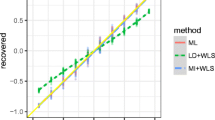Abstract
We analyze a new approach for simulation-based optimization of discrete event systems that draws on two recent stochastic optimization methods: an adaptive sampling approach called the nested partitions method and ordinal optimization. The ordinal optimization perspectives provides new insights into the convergence of the nested partitions method and guidelines for its implementation. We also use this approach to show that global convergence requires relatively simulation runs and propose new effective variants of the algorithm. Simulation results are presented to demonstrate the key results.
Similar content being viewed by others
References
Andradóttir, S. 1995. A method for discrete stochastic optimization. Management Science 41: 1946–1961.
Cassandras, C. G., Dai, L., and Panayiotou, C. G. 1998. Ordinal optimization for a class of deterministic and stochastic discrete resource allocation problems. IEEE Transactions on Automatic Control 43: 881–900.
Dai, L. 1996. Convergence properties of ordinal comparison in the simulation of discrete event dynamic systems. Journal of Optimization Theory and Applications 91: 363–388
Dai, L., and Chen, C. H. 1997. Rates of convergence of ordinal comparison for dependent discrete event dynamic systems. Journal of Optimization Theory and Applications 94: 29–54.
Gong, W.-B., Ho, Y.-C., and Zhai, W. 1999. Stochastic comparison algorithm for discrete optimization with estimation. SIAM Journal on Optimization 10: 384–404.
Ho, Y.-C., Sreenivas, R. S., and Vakili, P. 1992. Ordinal optimization of DEDS. Discrete Event Dynamic Systems: Theory and Applications 2: 61–88.
Ho, Y.-C. 1997. On the numerical solutions to stochastic optimization problems. IEEE Transactions on Automatic Control 42: 727–729.
Lee, L. H., Lau, T. W. E., and Ho, Y.-C. 1999. Explanation of goal softening in ordinal optimization. IEEE Transactions on Automatic Control 44: 94–99.
Norking, W. I., Ermoliev, Y. M., and Ruszczyński, A. 1998. On optimal allocation of indivisables under uncertainty. Operations Research 46: 381–395.
Ólafsson, S., and Shi, L. 1999. Optimization via adaptive sampling and regenerative simulation in P. A. Farrington, H. B. Nembhard, D. T. Sturrock, and G. W. Evans (eds), Proceedings of the 1999 Winter Simulation Conference, pp. 666–672.
Shi, L., and Ólafsson, S. 2000a. Nested partitions method for global optimization. Operations Research 48: 390–407.
Shi, L., and Ólafsson, S. 2000b. Nested partitions method for stochastic optimization. Methodology and Computing in Applied Probability 2: 271–291.
Tang, Z. B. 1994. Adaptive partitioned random search to global optimization. IEEE Transactions on Automatic Control 39: 2235–2244.
Xie, X. L. 1997. Dynamics and convergence rate of ordinal comparison of stochastic discrete event systems. IEEE Transactions on Automatic Control 42: 586–590.
Yan, D., and Mukai, H. 1992. Stochastic discrete optimization. SIAM Journal Control and Optimization 30: 594–612.
Author information
Authors and Affiliations
Rights and permissions
About this article
Cite this article
ólafsson, S., Shi, L. Ordinal Comparison via the Nested Partitions Method. Discrete Event Dynamic Systems 12, 211–239 (2002). https://doi.org/10.1023/A:1014531106176
Issue Date:
DOI: https://doi.org/10.1023/A:1014531106176



